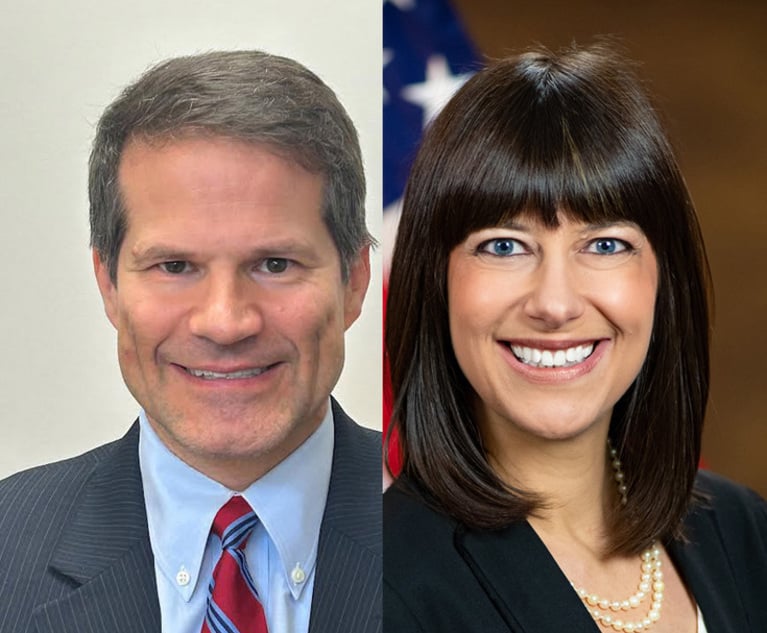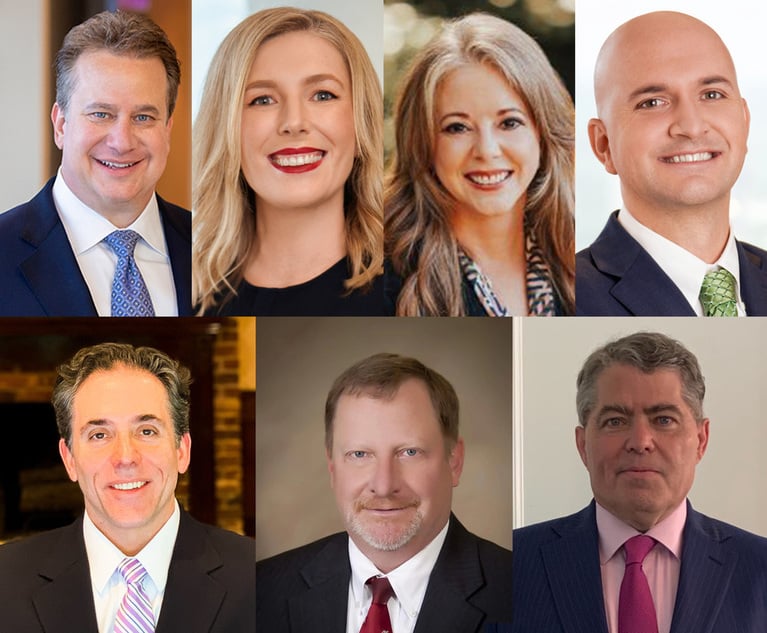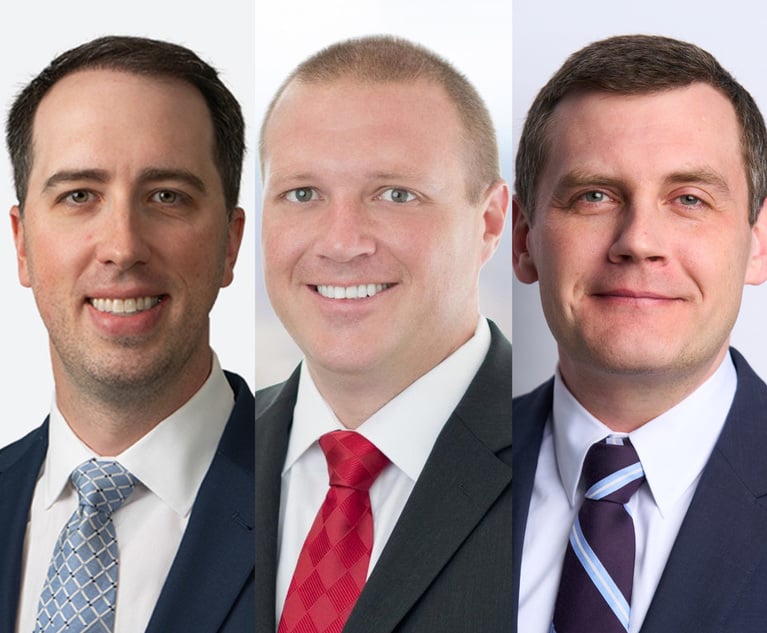 Georgia Attorney General Chris Carr (Courtesy photo)
Georgia Attorney General Chris Carr (Courtesy photo)Carr Elected to Full Term as State AG
Republican attorney general Chris Carr secured his first election victory and four-year term on Tuesday, narrowly defeating Democrat Charlie Bailey.
November 07, 2018 at 03:34 PM
3 minute read
Republican attorney general Chris Carr secured his first election victory and a full four-year term on Tuesday, narrowly defeating Democrat Charlie Bailey.
Carr garnered 51.42 percent of the vote to Bailey's 48.58 percent, a difference of nearly 110,000 votes out of about 3.8 million cast, according to the website of Georgia Secretary of State Brian Kemp, updated at 1:33 p.m. Wednesday.
In an interview late Wednesday morning, Carr declined to comment on the margin, stating simply, “I cannot be more honored to receive the support of nearly two million Georgians. I am so appreciative of that, don't take that lightly and look forward to earning the trust of all of our state citizens.”
For his part, Bailey said he was pleased with the strong Democratic showing and coming within just a few percentage points of his opponent.
“I'm proud of what we've done in 8.5 months,” he said in an interview Wednesday afternoon.
He added: “This was a historic election in Georgia, and [Carr] is credited with winning a tough race.”
In 2016, Gov. Nathan Deal appointed Carr AG after Sam Olens resigned. Carr was previously Deal's commissioner of economic development and chief of staff for U.S. Sen. Johnny Isakson, R-Georgia.
Carr's lack of criminal justice litigation experience prior to 2016 was a main point of attack on the part of Bailey, the former senior prosecutor with the Fulton County district attorney's gang unit who said that, if elected, he would form an organized crime division and gang division to coordinate law enforcement efforts statewide.
“We made the race about what we said was important and because there needed to be action on those things,” Bailey said of matters such as organized crime, gang violence and the opioid crisis. “And the fact that the race turned out to be about those things shows that that was what Georgia wanted.”
Carr said that, going forward, his office will continue to concentrate its efforts in the areas of human trafficking, cybercrime, opioid abuse, criminal gang activities and the protection of older and at-risk adults. It also, he added, will examine “the other issues in which our office can play a coordination role, policy role, legal role and educational role to protect the interests of the people of our state.”
Bailey said he is not sure yet where he will end up but added that “whatever I end up doing, it will be a role where I'm going to do my best to protect people and get them justice.”
This content has been archived. It is available through our partners, LexisNexis® and Bloomberg Law.
To view this content, please continue to their sites.
Not a Lexis Subscriber?
Subscribe Now
Not a Bloomberg Law Subscriber?
Subscribe Now
NOT FOR REPRINT
© 2024 ALM Global, LLC, All Rights Reserved. Request academic re-use from www.copyright.com. All other uses, submit a request to [email protected]. For more information visit Asset & Logo Licensing.
You Might Like
View All
Trump's Solicitor General Expected to 'Flip' Prelogar's Positions at Supreme Court


Fowler White Burnett Opens Jacksonville Office Focused on Transportation Practice
3 minute read
On The Move: Polsinelli Adds Health Care Litigator in Nashville, Ex-SEC Enforcer Joins BCLP in Atlanta
6 minute readTrending Stories
Who Got The Work
Michael G. Bongiorno, Andrew Scott Dulberg and Elizabeth E. Driscoll from Wilmer Cutler Pickering Hale and Dorr have stepped in to represent Symbotic Inc., an A.I.-enabled technology platform that focuses on increasing supply chain efficiency, and other defendants in a pending shareholder derivative lawsuit. The case, filed Oct. 2 in Massachusetts District Court by the Brown Law Firm on behalf of Stephen Austen, accuses certain officers and directors of misleading investors in regard to Symbotic's potential for margin growth by failing to disclose that the company was not equipped to timely deploy its systems or manage expenses through project delays. The case, assigned to U.S. District Judge Nathaniel M. Gorton, is 1:24-cv-12522, Austen v. Cohen et al.
Who Got The Work
Edmund Polubinski and Marie Killmond of Davis Polk & Wardwell have entered appearances for data platform software development company MongoDB and other defendants in a pending shareholder derivative lawsuit. The action, filed Oct. 7 in New York Southern District Court by the Brown Law Firm, accuses the company's directors and/or officers of falsely expressing confidence in the company’s restructuring of its sales incentive plan and downplaying the severity of decreases in its upfront commitments. The case is 1:24-cv-07594, Roy v. Ittycheria et al.
Who Got The Work
Amy O. Bruchs and Kurt F. Ellison of Michael Best & Friedrich have entered appearances for Epic Systems Corp. in a pending employment discrimination lawsuit. The suit was filed Sept. 7 in Wisconsin Western District Court by Levine Eisberner LLC and Siri & Glimstad on behalf of a project manager who claims that he was wrongfully terminated after applying for a religious exemption to the defendant's COVID-19 vaccine mandate. The case, assigned to U.S. Magistrate Judge Anita Marie Boor, is 3:24-cv-00630, Secker, Nathan v. Epic Systems Corporation.
Who Got The Work
David X. Sullivan, Thomas J. Finn and Gregory A. Hall from McCarter & English have entered appearances for Sunrun Installation Services in a pending civil rights lawsuit. The complaint was filed Sept. 4 in Connecticut District Court by attorney Robert M. Berke on behalf of former employee George Edward Steins, who was arrested and charged with employing an unregistered home improvement salesperson. The complaint alleges that had Sunrun informed the Connecticut Department of Consumer Protection that the plaintiff's employment had ended in 2017 and that he no longer held Sunrun's home improvement contractor license, he would not have been hit with charges, which were dismissed in May 2024. The case, assigned to U.S. District Judge Jeffrey A. Meyer, is 3:24-cv-01423, Steins v. Sunrun, Inc. et al.
Who Got The Work
Greenberg Traurig shareholder Joshua L. Raskin has entered an appearance for boohoo.com UK Ltd. in a pending patent infringement lawsuit. The suit, filed Sept. 3 in Texas Eastern District Court by Rozier Hardt McDonough on behalf of Alto Dynamics, asserts five patents related to an online shopping platform. The case, assigned to U.S. District Judge Rodney Gilstrap, is 2:24-cv-00719, Alto Dynamics, LLC v. boohoo.com UK Limited.
Featured Firms
Law Offices of Gary Martin Hays & Associates, P.C.
(470) 294-1674
Law Offices of Mark E. Salomone
(857) 444-6468
Smith & Hassler
(713) 739-1250






